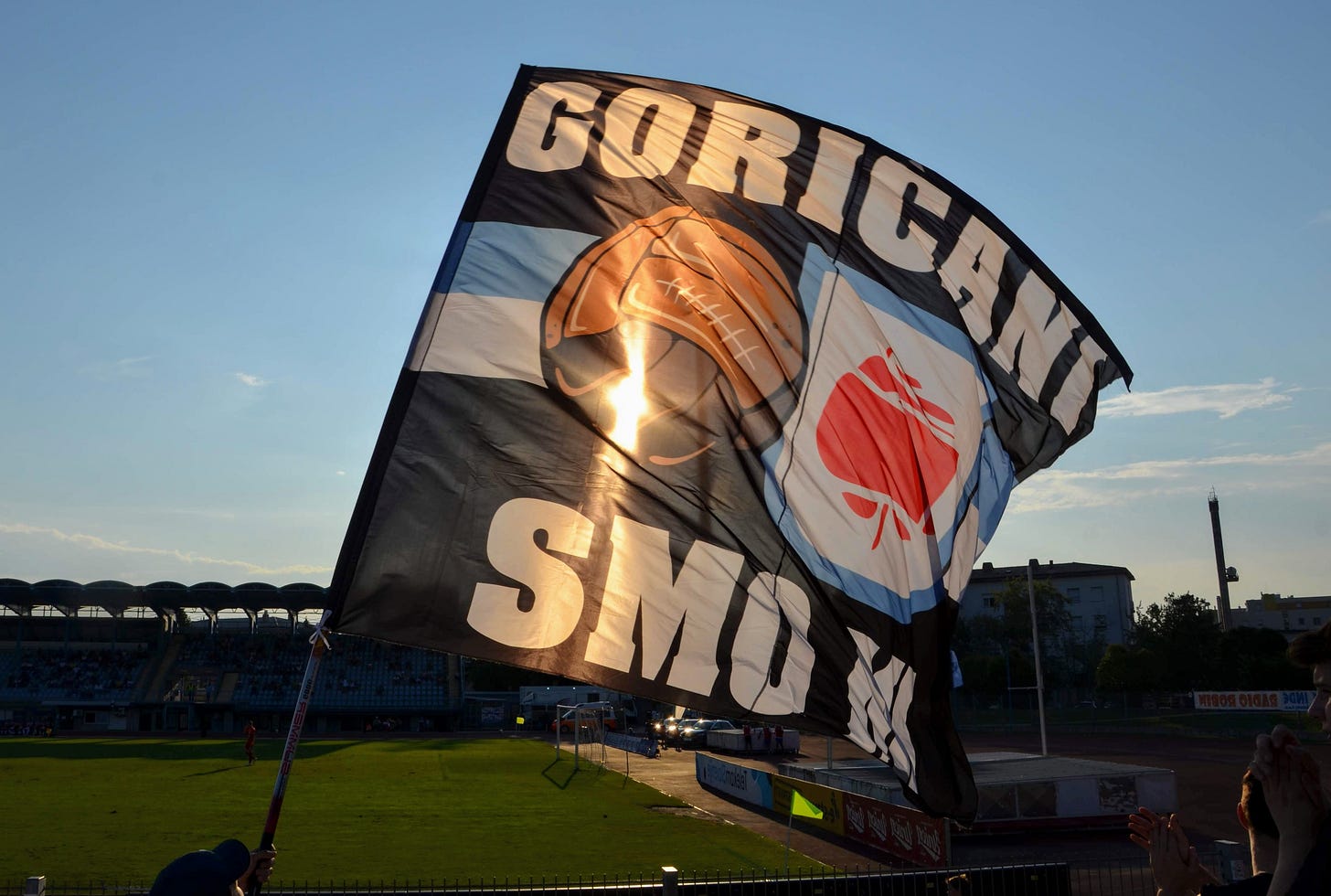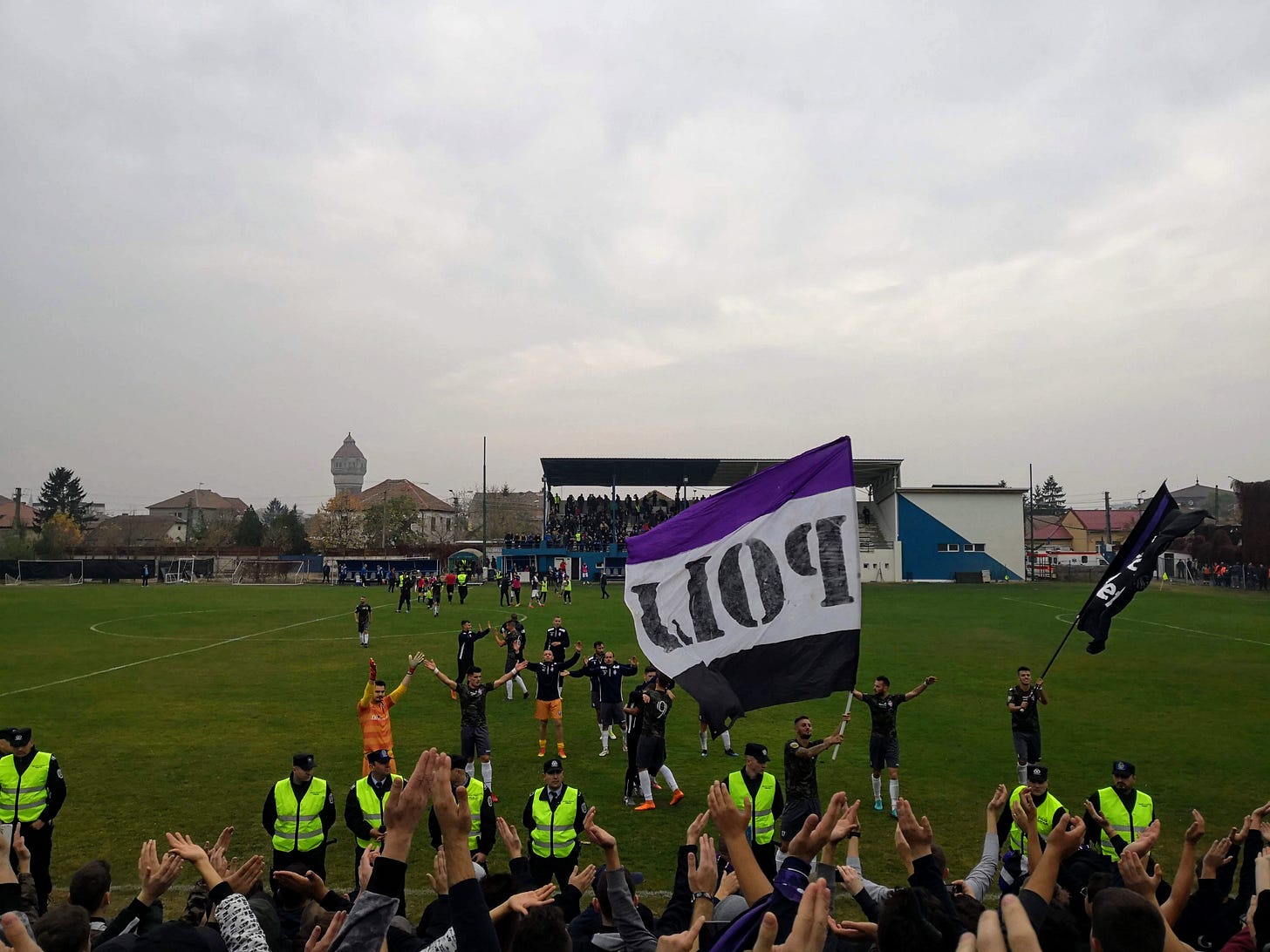S4E20. It's never 'just' a game
Interview with Gianni Galleri, author of 'Balkan Football Club' reportage book, on the atmosphere and role of football fandom. Among hot 'curve', abandoned stadiums and years of travels in the region
Dear reader,
welcome back to BarBalkans, the newsletter with blurred boundaries.
“Football is a passe-partout to open doors that would otherwise not only be closed, but barred. The secret is trivial, but very important: the love for a team and for this game is the same everywhere, and we recognize each other”.
These few lines are enough to explain why a football match is never ‘just’ a football match. Many experiences, hopes, frustrations, brotherhoods and identities are all mixed together in 90 minutes inside and - most of all - just outside the football pitch.
More specifically, in the curve, a very peculiar Italian concept that refers not only to the curved stands of seating where the most vocal supporters stand in a stadium, but also to the culture of football fandom itself.
Millions of people around the world share these same feelings and experiences. However, in some regions, talking about football and curve means discussing about the history, social dynamics and more elusive aspects of a territory. This is what the guest that BarBalkans is pleased to welcome today has been doing for many years.
Gianni Galleri, founder of Curva Est and Meridiano 13 projects, has collected the most evocative experiences inside and outside the stadiums all over the Balkan region in his latest reportage book Balkan Football Club.
An “adventurous journey in search of utopias and missed penalties”. From the Adriatic to the Black Sea, from the Danube to the Drina, he collected personal and collective stories, stereotypes to debunk and new lenses to interpret reality.
With one common thread. Balkan football and its fans.
Ten years of football and travel
«I received an email from Mauro Daltin, editorial director of Bottega Errante publishing house, during the Christmas holidays in 2020. In those few lines, we started a conversation that would later result in this book». This is how Galleri explains to BarBalkans the birth of Balkan Football Club.
A few months earlier (in March of the same year) Questo è il mio posto (‘This Is My Place’) - his second book of Balkan stories, football, fandom and identities after the paradigmatic Curva Est - had been published: «It had seen the light while people were entirely absorbed by more urgent issues, and it was almost unnoticed».
What could have been demoralizing turned out to be a fresh start for a new adventure. With the editorial director of Bottega Errante, «we began to think that there could be room for football» even in the catalog of this Italian publishing house.
The initial idea was to «merge Curva Est and Questo è il mio posto into one book as a slightly updated version of both of them». But as time passed, «we changed our mind and started again from scratch, while preserving the basic structure that already worked».
After all, we can say that Balkan Football Club «is the closing of the circle» opened with Curva Est: «The ingredients are the same, the doses change, and perhaps over time I have also learned to cook better».
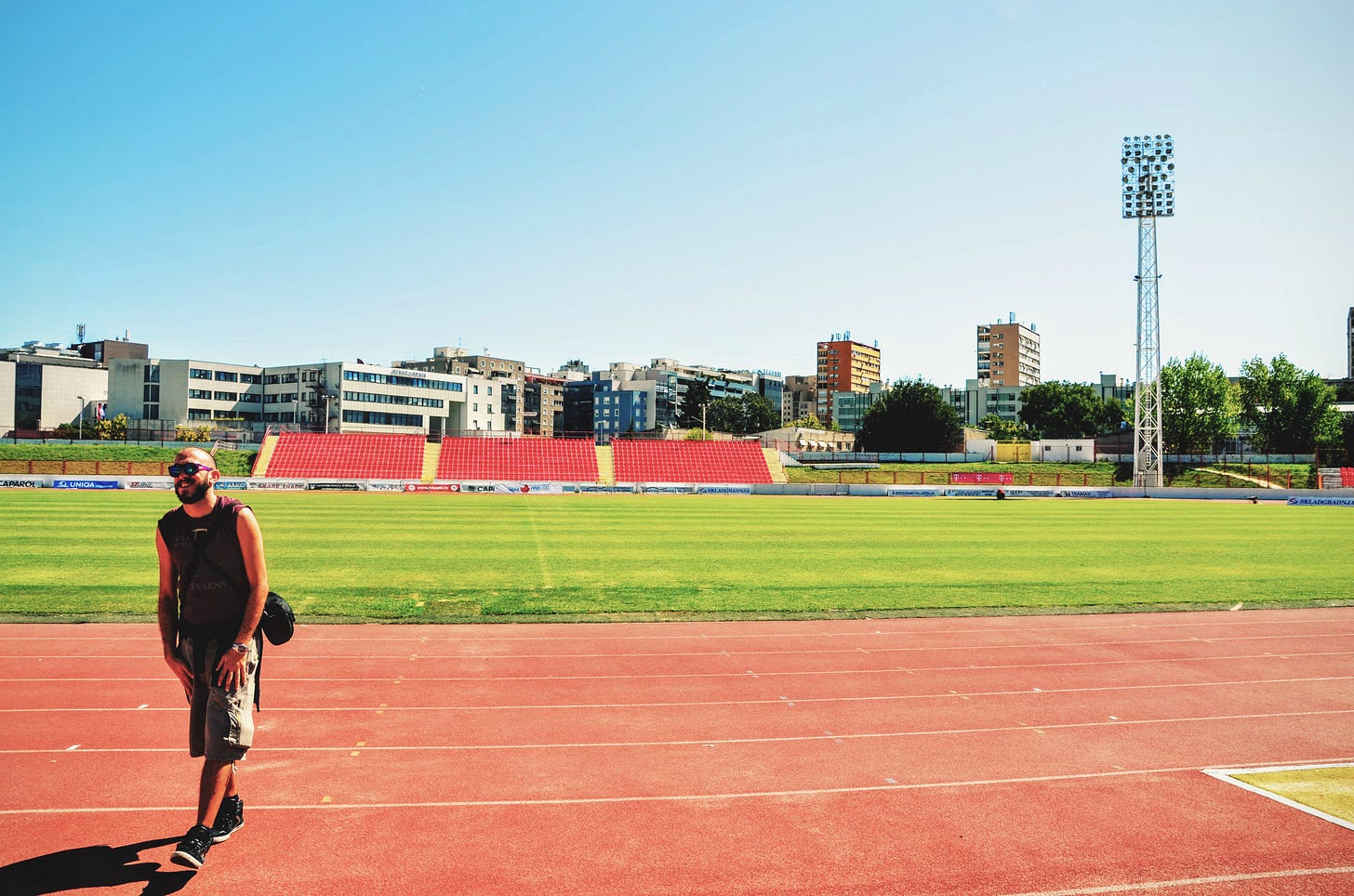
Such a detailed reportage took «ten years of travel», Galleri reveals. From the Hajduk Split pride to the Vardar Skopje decadence, from the Olimpija Ljubljana dramas to the tank on the forecourt of Red Star Belgrade stadium, the complex legacy of Kosovska Mitrovica Trepča and the hatred between Velež Mostar and Zrinjski.
«Weekends, whole weeks, short trips by plane, Catholic Easter holidays spent in Orthodox countries to avoid tourists». It is hard to keep an exact track of all these travels, but «every time there was a barely valid excuse, I would take a flight or take the wheel».
Read also: S4E3. Make haste slowly
At the same time, traveling companions were endless: «My girlfriend, at least four very trustworthy friends who followed me even to watch a match in the Slovenian minor league, without spoiling relationships» - the author of Balkan Football Club jokes, but not so much - «and I also often traveled alone».
After ten years of traveling, meeting, sharing football chants and drinks, Sundays at the stadium, reflections and written pages, «if I don’t leave with someone, there is always someone waiting on the other side for a beer and a chat».
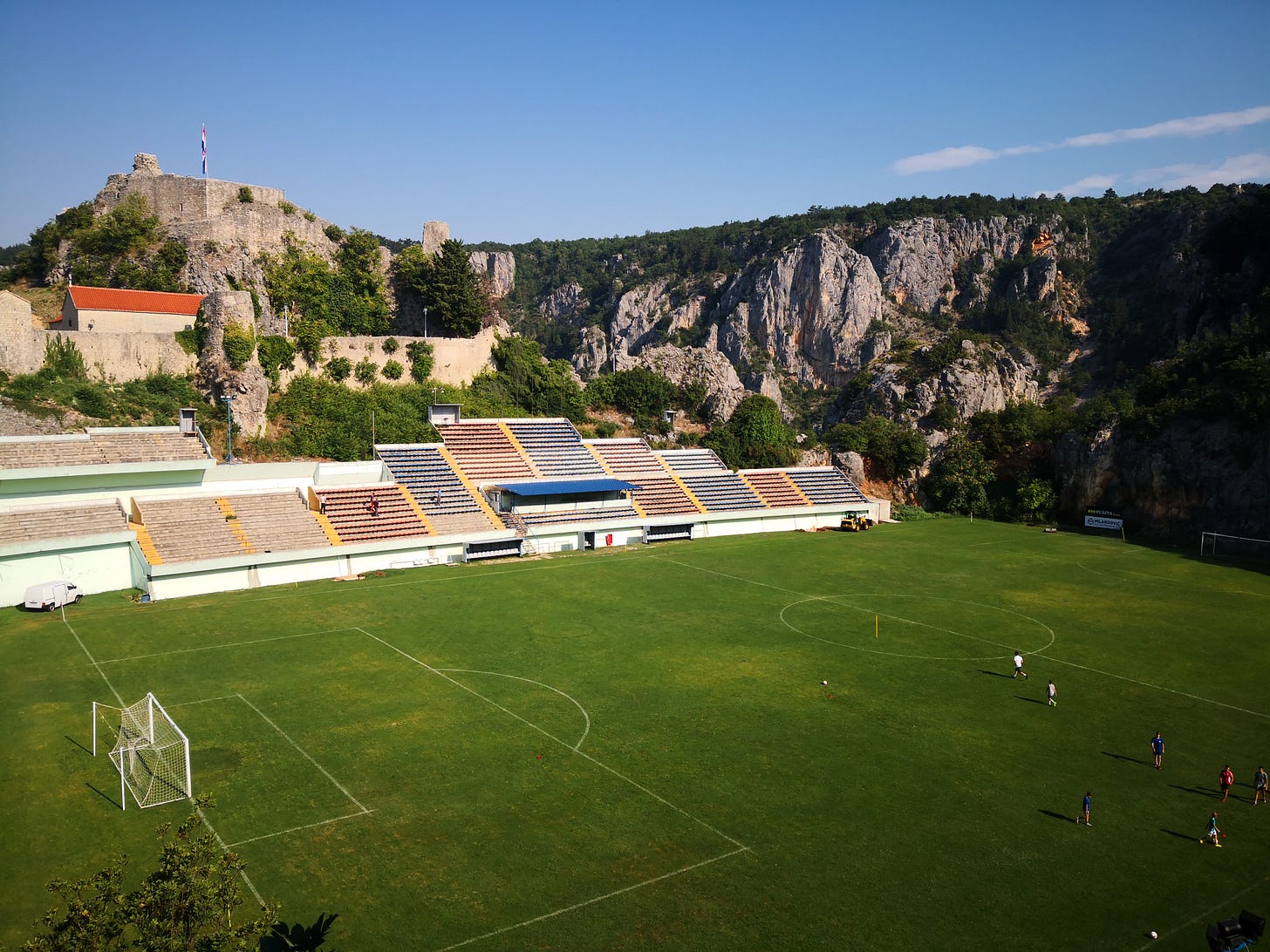
Choir leaders and abandoned stadiums
It is almost impossible to sum up in a few lines so many experiences and emotions, both inside and outside dozens of stadiums. However, a brief overview can give a glimpse of the atmosphere all over the Balkan peninsula.
«One of the most exciting moments I experienced was when, after a few years, I saw a friend again at a match», Galleri recalls. In the scorching heat of the Slovenian province, «we ran to each other and hugged. It is nice when someone who was a complete stranger until very recently shows all that happiness in seeing you again».
Read also: XLIII. The basketball factory
Another moment to remember is related to the sunset call to prayer in the old city of Ulcinj, in Montenegro: «Everything fell silent, the chants seemed to be answered from one minaret to another. It felt like being in another world, still and spiritual».
«After mentioning the sacred, I must close with the profane», the author of Balkan Football Club continues. The third «unforgettable» adventure was when «a group of ultras asked me and my friends to throw in football chants for an entire game because the opponents’ coach was Italian». After agreeing, «two crazy hours» followed, with «a lot of beer and some healthy, carefree spirit».
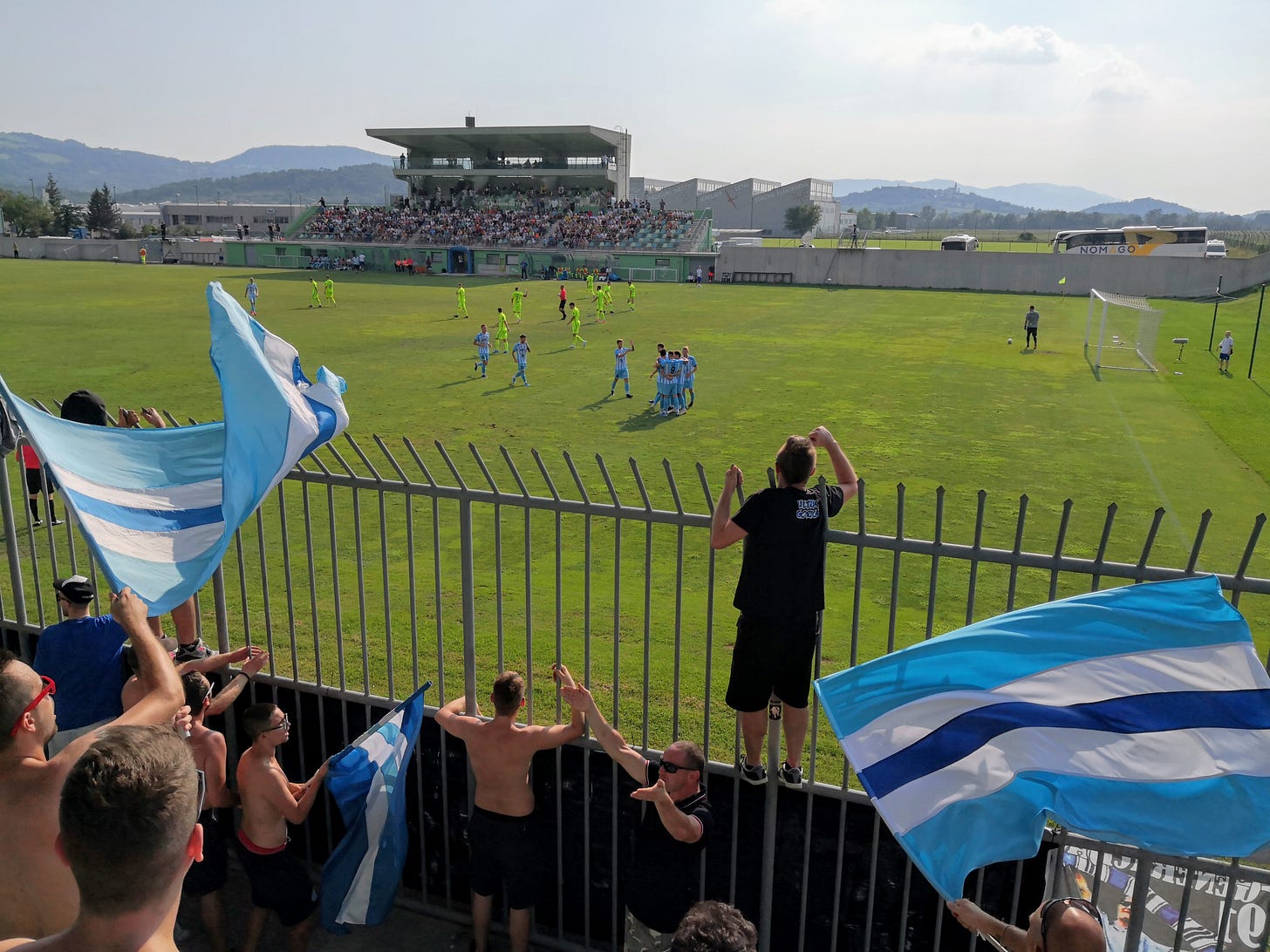
However, there is also another side to the coin. «There are always very disappointing moments, I think they are part of the economy of the adventure», and they «serve to give real value to the good ones».
According to Galleri, a «tremendous» disappointment took place in one of the most sensitive spots in the entire region (and not just for football reasons). «The stadium in Mitrovica, once the fiery home of Kosovo’s first team in Yugoslavia’s top division, is now a half-abandoned ruin that may never be renovated».
The feeling of abandonment is still vivid, «with reinforcing bars sticking out of the concrete and, absolutely out of context, a scoreboard at least 20 years newer than everything else also left there to rot».
This is a clear representation of the «distance between the city and its team, which no one seems interested in anymore». In the midst of social and political tensions between Kosovo and Serbia, in Mitrovica «the days of football as the passion of the people seemed even more distant».
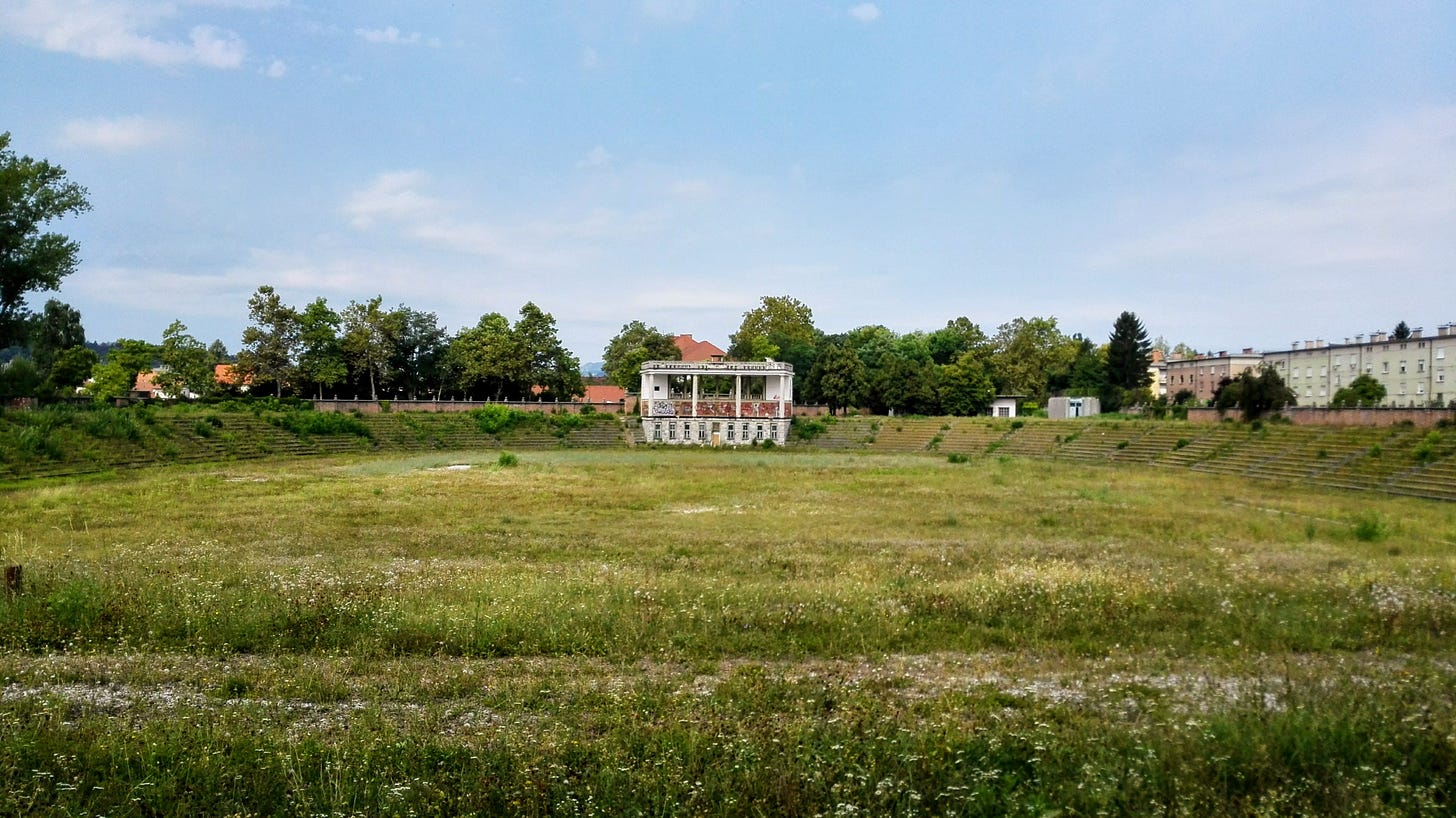
A mirror of society
Football is never just football, like football fandom is never just football fandom. Analyzing and talking about it can open important reflections on society.
This can apply all over the world, but especially in a very complex and sensitive region such as the Balkans. As Galleri explains, «in my opinion football can help us understand some of its social dynamics». If not all of them, «the advantage is the presence of a less-mediated environment».
In other words, «many times the distrust of a foreigner fades away when you see they have the same reactions while watching a football match». Without forgetting that «football fandom and curve are not worlds apart, but work exactly in the same way as the realities they belong to, sometimes just a little bit more amplified».
Read also: XXVI. The Return of the Great Yugoslavia
Without knowledge of the curve in the Croatian, Serbian, Montenegrin, Bosnian, Macedonian, Kosovar, Slovenian, Albanian, Bulgarian and Romanian provinces, many dynamics of these societies may remain unknown and overlooked.
For example, «I would have struggled to notice the so-called local-patriotism as an antithesis to the nationalism of Belgrade and Zagreb», Galleri explains this «very interesting phenomenon, which makes Serbian Subotica similar to Croatian Osijek and even coastal Rijeka». In the future, «we will hear more and more about it».
Moreover, curve and stadiums of the Balkan countries also have something to reveal about the recent past of the region.
«The Albanian ultras movement has a history of its own. Although it has in some cases reached the levels of the rest of the region nowadays, it still remains a very niche movement and is less representative of the country», the author of Balkan Football Club confirms. «This movement has had a more recent evolution and, for that reason, is less politicized, as it is not as closely tied to the socialist experience».
Read also: S2E12. FK Hooligans Belgrade, ep. 1
The former Yugoslav countries are very different, since we can easily find «a real relationship between the curve and society» there. The reason lies in the fact that «the ultras movement spanned the last two decades of the 20th century, a time when part of the history of those territories was made».
Although the role of organized groups «has often been exaggerated for narrative and journalistic purposes», it is quite clear that «something has remained, evident even in the words and references».
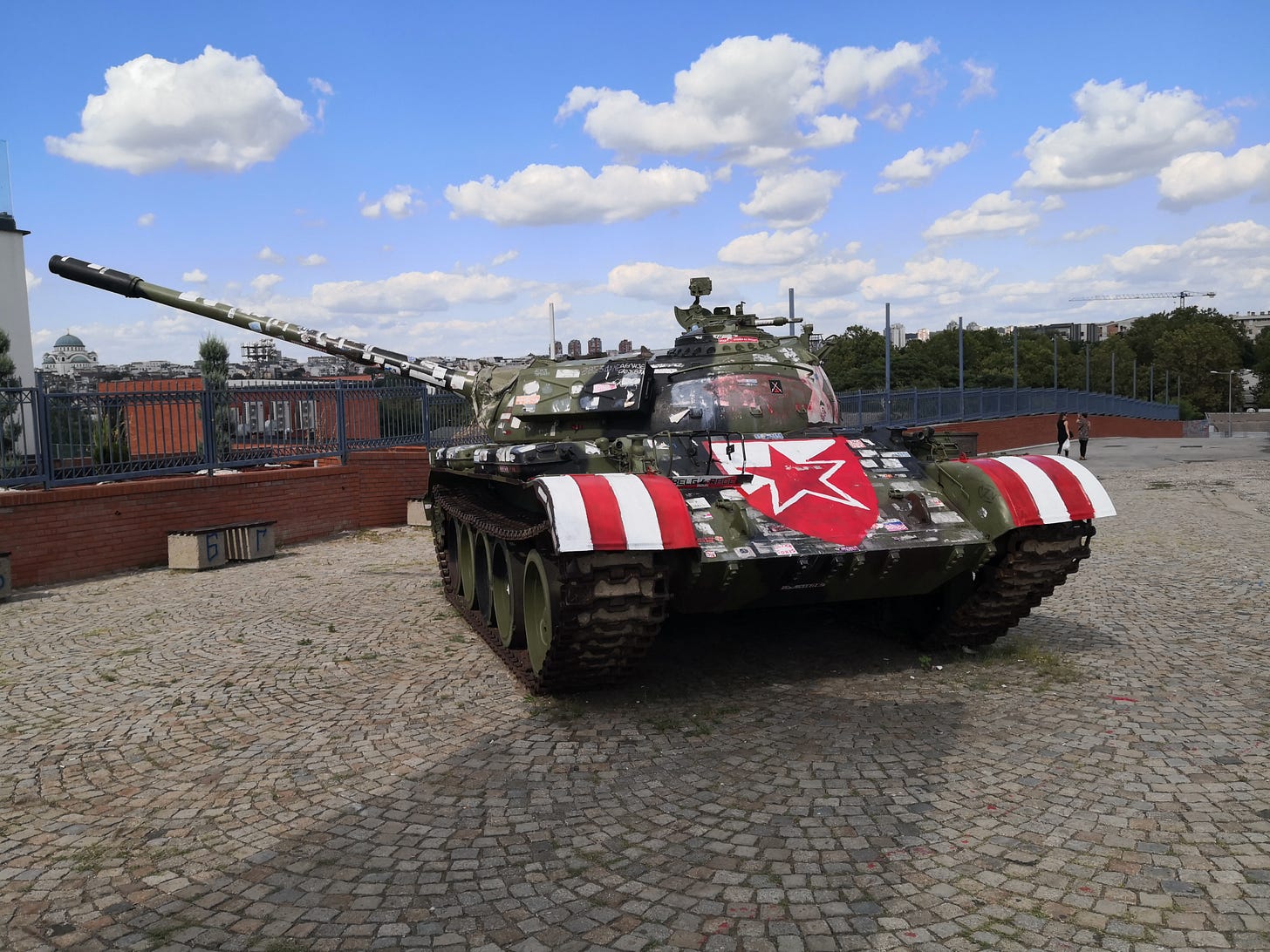
There are several examples that show this link between symbolism and language used by ultras, as well as their relationship to the present and past society of the countries that once belonged to the Socialist Federal Republic of Yugoslavia.
The tank outside the Red Star Belgrade stadium, while a tractor was placed outside ‘Maksimir’ stadium in Zagreb in response (evoking Operation Storm of 1995). The mentions of the Yugoslav Wars of the Nineties in the supporters’ street art. The competition to seize iconic sites, such as «Hajduk Torcida and Dinamo BBBs concurrently marking the territory of Vukovar and Knin». Or even the references to the Kosovo War «continuously chanted in the Serbian curve».
Read also: S2E13. FK Hooligans Belgrade, ep. 2
According to Galleri, «all this in part also reflects the immobility of the local and national politics, and the continuous search for a past where things were - if not better - undoubtedly still in progress».
In any case, we should not forget that, «like all spontaneous movements, the ultras movement is not monolithic», and there are also «minority and discordant voices» that need to be heard. «The local-patriots are an example, as well as some curve that embody inclusive and multiethnic messages».
This is the beginning of an honest and firsthand report of what is happening just outside the football pitches in the Balkan countries by a passionate connoisseur, supporter and author of a valuable reportage book on stories about football, fandom and curve in this region.
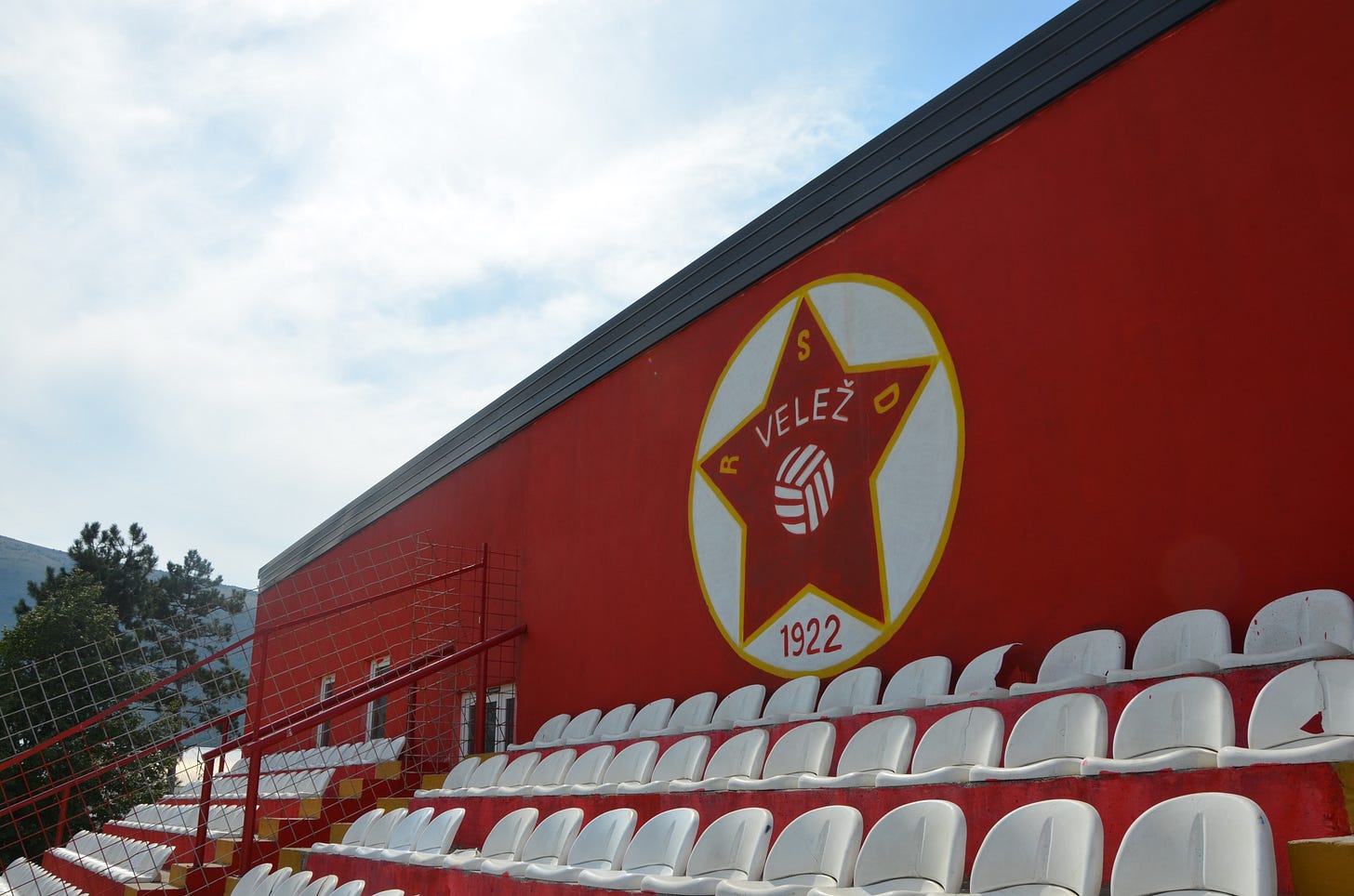
Pit stop. Sittin’ at the BarBalkans
We have reached the end of this piece of the road.
Today our bar, the BarBalkans, finds its place in one of the countless stadiums in the Balkans that have become somehow a home for our host.
«On a cold October morning, in a tense game inexplicably scheduled at 11 a.m. for public order reasons, a rakija helps warm up», Galleri recalls.
But there is no time to stop, in a curva this is just the beginning. «As the smoke bombs color the air and their acrid smell fills your nostrils and makes your eyes sting a bit», what we need is «a good sip of beer, just to wet our throats, because it’s time to chant loudly».
Sitting at a desk in Italy, «far from the Balkans and the football pitches that get me excited», this is «what I would like right now», the author of Balkan Football Club confesses. Planning the next trip, the next stadium, the next curva to witness.
Read also: S4E13. Gastronationalism tastes like nothing
Pay close attention, because BarBalkans will announce soon an event that cannot be missed, together with Gianni Galleri.
Looking forward to hear more details about his “adventurous journey in search of utopias and missed penalties”. And even more.
Let’s continue BarBalkans journey. We will meet again in two weeks, for the 21st stop of this season.
A big hug and have a good journey!
If you have a proposal for a Balkan-themed article, interview or report, please send it to redazione@barbalcani.eu. External original contributions will be published in the Open Bar section.
The support of readers who every day gives strength to this project - reading and sharing our articles - is also essential to keep BarBalkans newsletter free for everyone.
Behind every original product comes an investment of time, energy and dedication. With your support BarBalkans will be able to elaborate new ideas, interviews and collaborations.
Every second Wednesday of the month you will receive a monthly article-podcast on the Yugoslav Wars, to find out what was happening in the Balkans - right in that month - 30 years ago.
You can listen to the preview of The Yugoslav Wars every month on Spreaker and Spotify.
If you no longer want to receive all BarBalkans newsletters (the biweekly one in English and Italian, Open Bar external contributions, the monthly podcast The Yugoslav Wars for subscribers), you can manage your preferences through Account settings.
There is no need to unsubscribe from all the newsletters, if you think you are receiving too many emails from BarBalkans. Just select the products you prefer!





